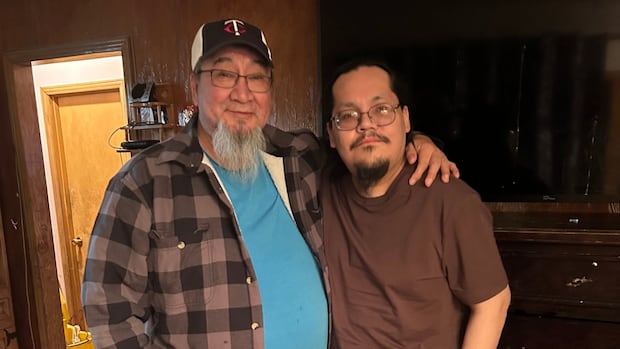Izzy Emmanuel says he doesn’t want to be invisible anymore.
That’s why he decided to relocate his tent from deep in the escarpment forest to right outside city hall on Monday in protest of Hamilton’s encampment ban and lack of affordable housing.
“Everyone who is homeless, their voice is non-existent,” Emmanuel told CBC Hamilton.
“What makes me irritated is if you take away our tents, you’re forcing people to sleep outside.”
The 29-year-old works as a line cook, earns minimum wage and hasn’t been able to afford to rent a place for years.
He spent his teenage years in foster care and got set up in an apartment for a while but was evicted after his rent went up and he couldn’t pay for two months, he said. He couch surfed with family and friends for a while before moving to the rail trail.
“I don’t know what else to do,” he said of his situation.
He was joined by two other people, including Jeanguy Parent, 58, who also face impending eviction from their tents along the rail trail, as well as volunteers from the Hamilton Encampment Support Network.
After one night at city hall, the group was served with trespass notices by two city bylaw officers accompanied by four police officers Tuesday afternoon. They were told they had a right to protest but had to take their tents down and should go to a shelter.
A bylaw officer called different shelters for them and informed Emmanuel and Parent two beds were available at a men’s shelter, which they declined. They instead went back to the rail trail.
Parent said he doesn’t stay in shelters because they are more often than not full, unsafe or triggering as other people use substances. He’s on the wait list for transitional housing and has lived near the rail trail for almost a year.
The city began clearing encampments near him earlier this month.
Parent and Emmanuel said while they haven’t been among those formally evicted, they’ve been told by officials it’s only a matter of time.
“We know something big is coming there,” Parent said.
Shelters are full, provider says
Over the winter, the city opened an 80-person outdoor shelter and added 192 more indoor shelter beds, bringing the total to 930. Then in March it began enforcing its bylaw that bans tents in parks with the expectation that encampment residents would move into shelters instead.
“Although capacity pressures exist, admissions do occur on a daily basis as a result of shelter users moving out to housing or other options,” said the city in a statement earlier this month.
But those spaces can be hard to come by.
The city said as of April shelters capacity was at:
- 96 per cent for men.
- 98 per cent for women.
- 88 per cent for families.
- 86 per cent for “adult mixed.”
- 65 per cent for youth.
- 55 per cent for emergency hotels.
Encampment residents have told CBC Hamilton they routinely call shelters in search of beds but have yet to find an opening. Staff at one shelter provider, the YWCA Hamilton, echoed that experience.
“They’re full,” said Chelsea Kirkby, vice president of strategic initiatives and program development. “There is turnover, naturally, and they’re filled immediately. It’s not frequent enough turnover to meet the need.”
She oversaw the opening of a 20-bed shelter for women and gender diverse people in December, funded by the city. It filled immediately, she said.
“We thought it would help relieve the pressure, but it has not,” Kirkby said.
The YWCA’s other drop-in shelter, which generally operates on a first-come-first-served basis, is also full every night, she said.
Emmanuel said sleeping in a tent leaves him tired and achy, with barely enough energy to work in a kitchen, where he earns about $1,100 a month, never mind calling shelters everyday looking for a spot.
“As a working homeless person, I want to quit my job,” he said. “I can barely do it.”






